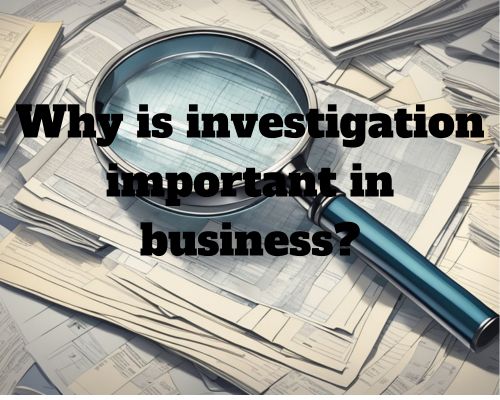Why is Investigation Important in Business:

Key Benefits and Best Practices
Charles Jimerson of Private Investigator West Palm has to say that “In business, investigations serve as critical tools to maintain integrity and accountability. They are essential for ensuring compliance with laws, safeguarding the company’s reputation, and mitigating risks. A thorough investigation can detect and prevent fraud, protect against legal issues, and address employee complaints effectively. This makes it a vital component of effective management and governance.”

For business owners, internal investigations are particularly important in maintaining a transparent and ethical work environment.
By addressing complaints or policy violations promptly, you can foster a culture of trust and accountability within the organization.
This not only enhances employee morale but also contributes to the overall success and stability of the business.
Ensuring comprehensive and impartial investigations also demonstrates a commitment to ethical business practices.
It reassures stakeholders, employees, and customers that your business operates fairly and responsibly.
Maintaining such standards is crucial for long-term success and sustainability in an increasingly scrutinized global business environment.
The Role of Investigation in Business Management
In business management, investigations play a crucial role in maintaining compliance, ensuring workplace integrity, and mitigating potential risks.
Proper investigations protect your business from legal liabilities and preserve its reputation.
Ensuring Compliance and Avoiding Legal Risks
Investigations help ensure that your business aligns with laws, regulations, and internal policies.
Regular audits and workplace investigations identify compliance issues early, preventing costly violations.
Failing to comply with regulations such as those enforced by the Securities and Exchange Commission can result in severe penalties and negative publicity.
Proper documentation during investigations is essential to demonstrate adherence to regulatory requirements.
Confidentiality is paramount; sensitive information must be handled with care to protect the attorney-client privilege.
By proactively investigating potential non-compliance, you can take corrective actions to mitigate risks and uphold company policies.
Investigating Internal Misconduct and Maintaining Workplace Integrity
Addressing employee misconduct such as harassment, discrimination, and theft is vital.
Conducting thorough workplace investigations ensures that allegations are assessed impartially, maintaining morale and trust.
Investigators should gather information from all relevant sources, including witnesses and employees, while ensuring confidentiality.
Taking prompt action against confirmed wrongdoing is crucial for maintaining a respectful workplace.
Disciplinary actions and follow-up measures demonstrate a commitment to a safe and ethical work environment, deterring future misconduct.
Whistleblower protections also foster an environment where employees feel safe reporting issues without fear of retaliation.
Consequences of Inadequate Investigations
Inadequate investigations can lead to liability, legal claims, and significant damages.
When misconduct is not properly addressed, it can escalate and result in workplace hostility.
This affects employee morale, decreases productivity, and can attract negative publicity.
Moreover, if investigations are insufficiently documented, your business may struggle to defend against legal risks and claims of negligence.
This openness to legal vulnerabilities underscores the necessity of comprehensive internal investigations and the implementation of robust internal controls.
Best Practices in Conducting Business Investigations
Private Investigator West Palm highlights that, when conducting business investigations, it is crucial to have a structured process, uphold ethics, and clearly outline roles and responsibilities.
This ensures thorough and fair investigations, maintaining trust and compliance within the organization.
Structuring the Investigation Process Effectively
An effective investigation begins with a well-defined plan.
This includes outlining steps for fact-finding, data review, and defining the scope.
Organize interviews with potential witnesses and maintain detailed notes. Clear timelines and milestones help track progress.
Use documentation tools like spreadsheets or databases to log findings.
After gathering information, compile a final report that presents facts objectively.
This report should detail findings, remediation actions, and recommendations for policy updates.
Ensure all actions are consistent to safeguard legal privilege.
Upholding Ethics and Impartiality During Investigations
Ethics and impartiality are foundational.
Commit to neutrality, whether you are an HR professional, manager, or external investigator.
Avoid conflicts of interest by involving parties without personal stakes. Maintain confidentiality to protect the integrity of the process and the individuals involved.
Adopt a non-discriminatory approach, treating all co-workers fairly regardless of position or relationship.
Ensure the investigation is fact-based rather than influenced by perceptions.
Ethical conduct builds trust and compliance, reinforcing a company’s commitment to ethics.
Roles and Responsibilities of Investigative Parties
Define clear roles for the investigative team.
HR professionals typically manage the process, ensuring all protocols are followed. Meanwhile, managers and directors may provide necessary documentation and context.
In cases of potential legal complications, involving outside counsel or an outside law firm ensures compliance and thoroughness.
Auditors might be required for financial issues, while outside parties may be consulted in cases of insider trading or violence.
Working transparently with investigative authorities like the police when necessary can achieve co-operation credit. This also helps maintain the integrity and legal standing of the investigation.
By setting clear responsibilities, your organization can navigate the complexities of internal investigations effectively, maintaining compliance and upholding ethical standards.





